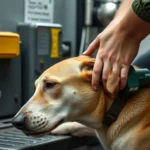
Monitoring a dog’s digestive health is crucial for any responsible pet owner. Diarrhea in dogs can be a common occurrence, but its implications can range from benign to severe. Understanding when diarrhea becomes an emergency is vital for ensuring your dog’s well-being and potentially saving their life.
Understanding Dog Diarrhea
What is Diarrhea in Dogs?
Diarrhea refers to the frequent passage of loose or watery stools. In dogs, this condition can vary in severity based on the underlying cause. Generally, diarrhea can be categorized into acute and chronic forms.
- Acute diarrhea lasts for a short period, usually less than two weeks, and is often associated with dietary indiscretion or infections.
- Chronic diarrhea persists for more than two weeks and may indicate underlying health issues such as inflammatory bowel disease (IBD) or chronic pancreatitis.
Common Causes of Diarrhea
Several factors can trigger diarrhea in dogs, including:
- Dietary Indiscretion: Dogs are notorious for eating things they shouldn’t, whether it’s garbage, human food, or sudden changes in their diet.
- Infections: Bacterial, viral, and parasitic infections can all lead to gastrointestinal upset.
- Medical Conditions: Conditions like IBD, pancreatitis, and allergies can manifest as diarrhea.
- Medications and Toxins: Certain medications or exposure to toxins can irritate a dog’s gastrointestinal tract.
Recognizing the Signs of Dog Diarrhea
Physical Symptoms
When assessing diarrhea, it’s crucial to note the consistency and frequency of your dog’s stool. Typical signs include:
- Stool Consistency: Watery, soft, or distinctly abnormal stools.
- Frequency: An increase in the number of bowel movements.
Other accompanying signs may include vomiting, lethargy, or changes in appetite, which can indicate a more serious issue.
Behavioral Changes
Behavioral observations are equally important. Watch for:
- Energy Levels: Dogs with diarrhea often appear lethargic or less active than usual.
- Signs of Discomfort: Whining, pacing, or attempting to hide can indicate pain or discomfort.
- Excessive Thirst or Urination: This can be a sign of dehydration, especially if diarrhea persists.
Assessing the Severity of Diarrhea
Duration and Frequency
The duration and frequency of diarrhea can help gauge its severity:
- Less than 24 Hours: While any diarrhea warrants attention, it may not be an emergency if it resolves quickly.
- More than 48 Hours: Diarrhea persisting beyond this timeframe is often more concerning and requires veterinary attention.
- Episodes per Day: Multiple episodes in a day increase the risk of dehydration and other complications.
Accompanying Symptoms
Accompanying symptoms can significantly affect the urgency of the situation:
- Vomiting and Fever: These symptoms can indicate a more severe underlying condition.
- Urgency Indicators: Bloody stools, severe abdominal pain, or a lack of appetite are serious red flags.
Dog’s Age and Health History
The age and health history of your dog are critical factors to consider:
- Puppies and Senior Dogs: These age groups are more vulnerable to complications from diarrhea.
- Pre-Existing Health Conditions: Dogs with conditions like diabetes or kidney disease may experience exacerbated symptoms.
When to Consider Diarrhea an Emergency
Immediate Signs of Concern
Certain signs should prompt immediate veterinary attention:
- Blood in Stool or Vomit: This can indicate internal bleeding or severe gastrointestinal distress.
- Signs of Dehydration: Look for dry gums, sunken eyes, or excessive thirst.
- Severe Lethargy or Unresponsiveness: If your dog is unusually lethargic or unresponsive, it may be a sign of a serious condition.
Timeframes for Action
Time is of the essence regarding diarrhea:
- 24-Hour Rule: If diarrhea persists for more than 24 hours, it’s advisable to contact your veterinarian.
- Prompt Action: For severe cases, immediate veterinary care is crucial to prevent complications.
What to Do When Diarrhea Becomes an Emergency
Steps to Take Before Visiting the Vet
Before heading to the vet, gather pertinent information:
- Observation Notes: Document the duration of diarrhea, frequency, and any accompanying symptoms.
- Stool Sample: If possible, collect a sample of your dog’s stool for your vet to analyze.
What to Expect at the Vet
During your visit, the veterinarian may conduct several diagnostic tests, including:
- Blood Work: To check for dehydration, infection, or organ function.
- Fecal Exams: To identify parasites or other gastrointestinal issues.
- Treatment Options: Depending on the diagnosis, treatment may involve medications, dietary changes, or supportive care.
Prevention and Management
Dietary Considerations
Maintaining a balanced diet is essential for your dog’s digestive health:
- Quality Food: Invest in high-quality dog food formulated for their specific needs.
- Gradual Diet Changes: If you need to change your dog’s food, do it gradually to avoid gastrointestinal upset.
Routine Veterinary Care
Regular veterinary check-ups are crucial for early detection of potential health issues:
- Vaccinations and Preventative Care: Ensure your dog stays up-to-date on vaccinations and preventative treatments.
- Discuss Concerns: Don’t hesitate to bring up any digestive issues with your vet during routine visits.
Home Remedies and Over-the-Counter Solutions
For mild cases of diarrhea, some home remedies may be appropriate:
- Bland Diet: Offer plain boiled chicken and rice to help settle the stomach.
- Hydration: Ensure your dog has access to fresh water to prevent dehydration.
However, caution is advised when considering over-the-counter medications. Always consult your veterinarian before administering any treatments.
Conclusion
Understanding when dog diarrhea is an emergency can make a significant difference in your dog’s health and well-being. By recognizing the signs and symptoms, assessing the severity, and knowing when to seek veterinary care, you can take proactive steps to ensure your furry friend remains happy and healthy. Always monitor your dog’s health and be vigilant about changes in their digestive patterns.
FAQs
-
What should I do if my dog has diarrhea?
Monitor the severity and duration. If it lasts more than 24 hours or is accompanied by concerning symptoms, consult your vet. -
Can I treat my dog’s diarrhea at home?
Mild cases may be managed at home with a bland diet and ensuring hydration, but always seek veterinary advice for persistent or severe cases. -
When should I take my dog to the vet for diarrhea?
If diarrhea lasts more than 24 hours, is accompanied by blood, vomiting, or signs of dehydration, seek immediate veterinary care. -
Are there specific foods that can help with dog diarrhea?
A bland diet of cooked chicken and rice can help settle a dog’s stomach during mild episodes. -
Is diarrhea in dogs contagious?
Some causes of diarrhea, particularly infections, can be contagious. It’s advisable to keep infected dogs away from other pets until cleared by a veterinarian.
By maintaining awareness of your dog’s health and recognizing the signs of distress, you can ensure that your canine companion receives the care they need when it matters most.









